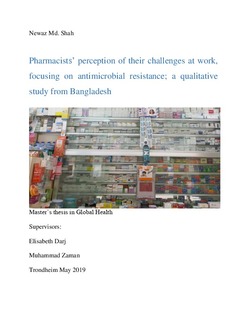| dc.description.abstract | Background Antimicrobial Resistance (AMR) is one of the major global health problems. The indiscriminate use of antimicrobial medicines has led to the development of resistance among various microorganisms. The growing resistance compromises the effectiveness of medicines and the WHO declared that controlling AMR is a top priority for global health. Bangladesh is a low- middle-income country, but despite the improved healthcare indicators, infectious diseases remain a prioritized public health problem. Shortage of physicians within the country, force patients to look for healthcare services from facilities without the supervision of qualified medical personnel, including retail pharmacists.
Method A qualitative study design was employed to explore retail pharmacist’s perceptions and awareness regarding AMR, their challenges at work and their preference for antimicrobial medicine when used for patient’s treatment.
Findings Twenty-four individual interviews of retail pharmacists in Bangladesh were conducted. The retail pharmacists described their motivations and challenges in their profession. They demonstrated a wide range of knowledge and concerns regarding AMR in Bangladesh. According to them, broad-spectrum antibiotics are frequently used, despite being a well-known cause for AMR. Old prescriptions, self-medication, lack of regulations and the easy availability of antimicrobial medications, were key factors which contribute to the misuse of antimicrobial treatment, found in the study. The pharmacists meant that these issues need to be addressed properly to control the AMR situation.
Conclusion Knowledge and practice gaps among retail pharmacists and patients were identified in this study. Although, the pharmacists understood the reasons of the development of AMR, a need to understand the long-term impact is essential. Introducing proper knowledge of AMR in the pharmacists’ education, need to balance information provided by the pharmaceutical representatives and Internet, and this would be beneficial to control AMR. Innovative programs like ‘Model Pharmacy’ should be introduced to raise awareness in society. | |
